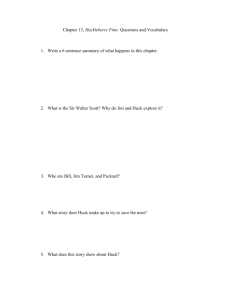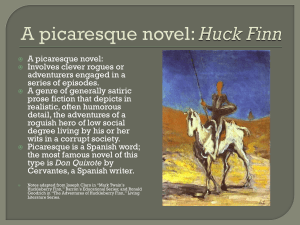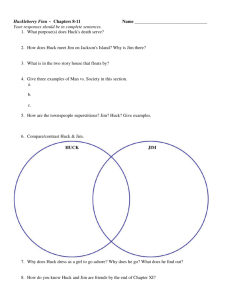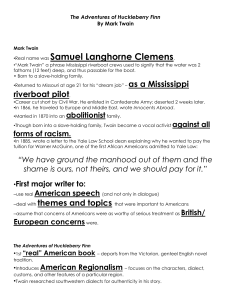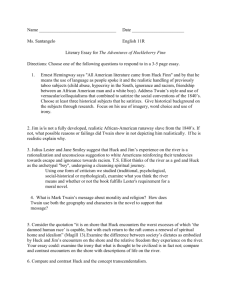An Anti-Racist Message-A Huckleberry Finn BQ Essay
advertisement
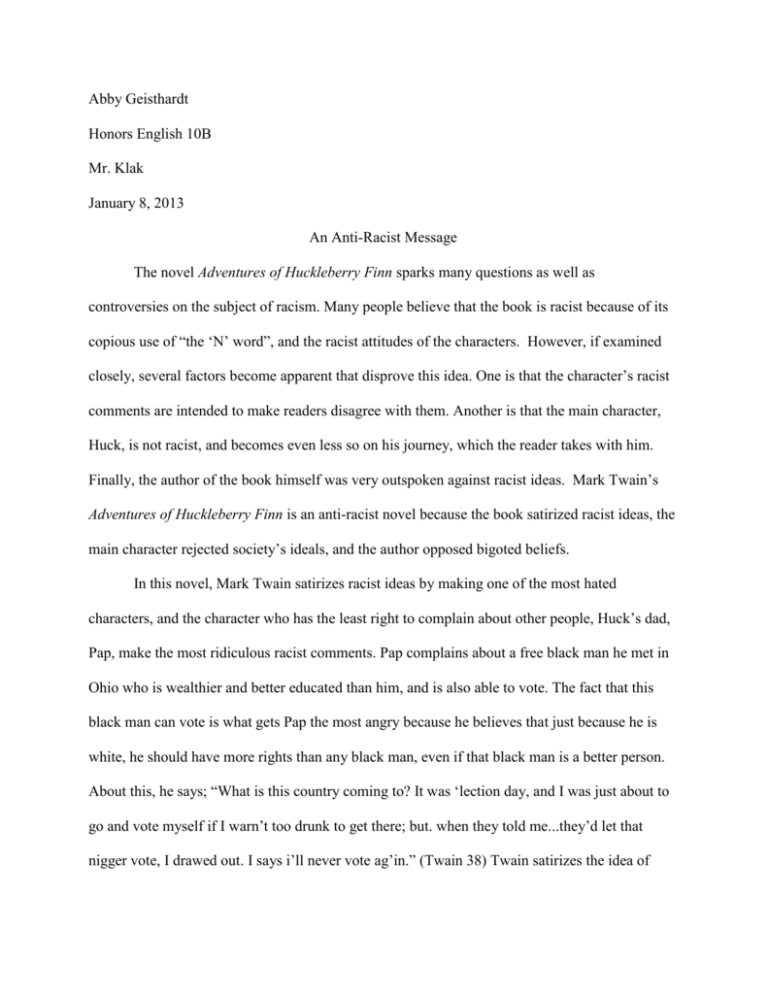
Abby Geisthardt Honors English 10B Mr. Klak January 8, 2013 An Anti-Racist Message The novel Adventures of Huckleberry Finn sparks many questions as well as controversies on the subject of racism. Many people believe that the book is racist because of its copious use of “the ‘N’ word”, and the racist attitudes of the characters. However, if examined closely, several factors become apparent that disprove this idea. One is that the character’s racist comments are intended to make readers disagree with them. Another is that the main character, Huck, is not racist, and becomes even less so on his journey, which the reader takes with him. Finally, the author of the book himself was very outspoken against racist ideas. Mark Twain’s Adventures of Huckleberry Finn is an anti-racist novel because the book satirized racist ideas, the main character rejected society’s ideals, and the author opposed bigoted beliefs. In this novel, Mark Twain satirizes racist ideas by making one of the most hated characters, and the character who has the least right to complain about other people, Huck’s dad, Pap, make the most ridiculous racist comments. Pap complains about a free black man he met in Ohio who is wealthier and better educated than him, and is also able to vote. The fact that this black man can vote is what gets Pap the most angry because he believes that just because he is white, he should have more rights than any black man, even if that black man is a better person. About this, he says; “What is this country coming to? It was ‘lection day, and I was just about to go and vote myself if I warn’t too drunk to get there; but. when they told me...they’d let that nigger vote, I drawed out. I says i’ll never vote ag’in.” (Twain 38) Twain satirizes the idea of racism by making this comment come from such a disrespectful, uneducated, hypocritical character, who makes terrible choices, and who is clearly inferior in many ways to this welleducated, well-respected black man who he firmly believes he is superior to.This exposes the true ridiculousness of racism and sends the message that you shouldn’t judge others on such negligible characteristics, especially when you don’t look to see if there is anything wrong with yourself. Over the course of the story, the main character, Huck Finn, begins to reject the racist ideas he had been brought up learning. In the same way, as the story goes on, the reader learns the same lessons as Huck himself does. Although at the beginning of the story, Huck does think and say things that seem racist, such as saying that Miss Watson’s slave Jim “had an uncommon level head for a nigger” (105), and implying that black people aren’t as smart. However, he was just thinking and acting the way that society had taught him to. Over time, Huck learns that this is not the way he wants to live his life. The first example of this is when he first meets Jim on Jackson’s Island, and before Jim tells Huck that he has run away, he makes Huck promise that he won’t tell anyone. Huck does, and even though he is shocked by the news, when Jim hastily reminds him that he said he wouldn’t tell, he says; “ Well, I did. I said I wouldn’t, and I’ll stick to it....People would...despise me for keeping mum--but that don’t make no difference. I ain’t agoing to tell.” (59) In saying this, Huck is treating Jim like he would treat any friend; by keeping a promise, even though it could mean trouble for him. This shows that Huck is able to look past the popular beliefs about race and see Jim as an equal. On their journey, Huck and Jim grow closer and closer as friends and Jim even becomes somewhat of a father figure for Huck. However, at some points during the story Huck does consider turning Jim in, but only because he has been taught that it would be the right thing to do. When Huck discovers that Jim has been captured, he believes that the right thing would be to write to Miss Watson and tell her where Jim is. He starts to feel horrible about “stealing” Jim from her. He gets angry with himself for helping Jim escape. He thinks that if he would have gone to Sunday School, he would have learned that people that do what he did go to hell. He decides to write Miss Watson, and immediately feels “good and all washed clean of sin for the first time [he] had ever felt so in [his] life”.(303) But then he thinks about how Jim said earlier that Huck was the best friend he ever had, and he makes a huge decision not to send the letter. Upon reaching this decision, he says; “All right, then, I’ll go to hell”. (304) This is the moment where Huck really decides to not be racist and sees Jim as completely equal to him, because no one would sacrifice being accepted by everyone else like that for someone who they truly believed they were superior to. Some people may think that the fact that Huck still believes he will go to hell for helping Jim makes him racist, because it means that some part of him still thinks that helping Jim is wrong. However, this really just reflects that Huck is struggling to understand religion, and that people like himself, who want to believe in something but don’t quite understand religion, sometimes don’t interpret it correctly. In addition, Huck is also struggling with the fact that his anti-racist beliefs oppose what he had learned his whole life. Possibly the biggest reason why this book is not racist is very simple; the author, Mark Twain, was not racist. In fact, he was anything but racist. Twain was an advocate for the civil rights of all people; he was an active abolitionist, a big supporter of women’s rights, and defended all those whom his own race was prejudiced against. (Twain) Many of his other works had similar anti-racist themes to his novel, Adventures of Huckleberry Finn. In 1870, while living in San Francisco, he wrote an article called “Disgraceful Persecution of a Boy”, about a young boy being jailed for stoning a Chinese man. No, he did not agree with what the boy had done, but he was outraged that people would punish a child for doing something based on what they themselves, and society, had taught him. He blamed all the adults who had an influence on the boy for leading him to think something like; “Ah, there goes a Chinaman! God will not love me if I do not stone him.” (Twain) Even in this non-fiction, opinion article, Twain satirizes the idea of racism to hopefully make people see the poorness of the decisions they had been making, by showing them what they were raising their children to be. This relates to the Adventures of Huckleberry Finn, because Huck thinks very similarly when it comes to whether or not he should turn Jim in. Twain also, being a passionate supporter of African American rights, helped pay for Warner McGuinn, a black student, to attend Yale Law School. (Scharnhorst) He felt that white people owed African Americans for “have[ing] ground the manhood out of them”, because “the shame is ours, not theirs, and we should pay for it.” (Twain, as cited by Scharnhorst) One of Twain’s most famous quotes against racism was: “One of my theories is that the hearts of men are about alike, all over the world, whatever their skin-complexions may be.” (Quotes of Mark Twain) With an author so anti-racist and humanitarian, there is no way one of his biggest works would be racist in any way. The novel Adventures of Huckleberry Finn satirized racist ideas, it’s main character rejected society’s racist ideals, and it’s author opposed bigoted beliefs, giving the book a very powerful anti-racist message. In the novel, racism is satirized in such a way that it makes the reader think twice about how they judge and treat people different from themselves. The reader also learns through the eyes of Huck Finn, a young boy, as he starts to resent the racist acts and attitudes that were so common in his society. The author himself was publically against any form of racism or prejudice, and it is very clear that he would never write something that would incite racism; he only sought to prevent it. All in all, the novel itself is unarguably anti-racist. Works Cited “The Quotes of Mark Twain.” Suzy Red. Kid's Wings, n.d. Web. 10 Jan. 2013. <http://suzyred.com/twainquote.html>. Scharnhorst, Gary. “Mark Twain's Relevance Today.” American Studies Journal . ZUSAS, 2011. Web. 10 Jan. 2013. <http://www.asjournal.org/op/6/index.html>. Twain, Mark. Adventures of Huckleberry Finn. New York, New York: Pocket Books, 2004. Print. Twain, Mark. “Disgraceful Persecution of a Boy.” The Galaxy Magazine May 1870. Web. 10 Jan. 2013. Twain, Mark. “Votes for Women.” Hebrew Technical School for Girls. New York, New York. 20 Jan. 1901. Web. 10 Jan. 2013.
